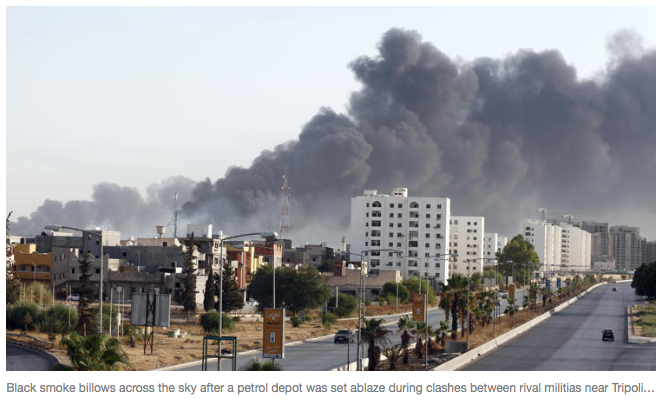UN condemns fresh clashes in Libyan capital
AFP
Tripoli (AFP) – The United Nations condemned a new round of fighting between rival militias around Tripoli international airport, saying the clashes were undermining Libya’s political process.
Since mid-July, Libya has been rocked by fierce and deadly fighting between militias that has prompted an exodus of foreign nationals from the oil-rich North African country.
The skirmishes have centred around Tripoli, where nationalists militiamen are battling pro-Islamist groups, and in second city Benghazi where a renegade army general is fighting Islamists.
The new clashes in Tripoli raged on Friday and Saturday, forcing hundreds of people to flee, residents said. There were no immediate reports of casualties.
The confrontation between nationalist militiamen from Zintan and pro-Islamists from Misrata focused on a bridge leading to the capital’s airport, which is controlled by the Zintan forces, residents added.
Grad missiles and artillery were used in two days of battle which subsided Sunday after an unconfirmed claim by the Misrata fighters that they had seized the bridge and an army barracks.
State news agency Lana said that around 1,000 families had fled the Tripoli fighting and were taken in by local officials in the town of Tarhuna, south of the capital.
The United Nations Support Mission in Libya (UNSMIL) condemned the clashes and once again urged both parties to lay down their arms and observe a ceasefire.”
It said the two days of violence had “inflicted casualties among civilians, forced them out of their homes and caused damage to property.”
UNSMIL “warns that the continued fighting poses a serious threat to Libya’s political process, and to the security and stability of the country,” the statement said.
On Wednesday Libyan MPs, who have been meeting in the eastern city of Tobruk to avoid the Tripoli unrest, appealed for international intervention to protect civilians across the country.
Since the fall of long-time dictator Moamer Kadhafi in 2011, the interim authorities have failed to establish order and security in a country prone to anarchy and deadly violence.
They have been unable to restrain a large number of militias formed by ex-rebels who fought Kadhafi and who still hold sway across Libya.
